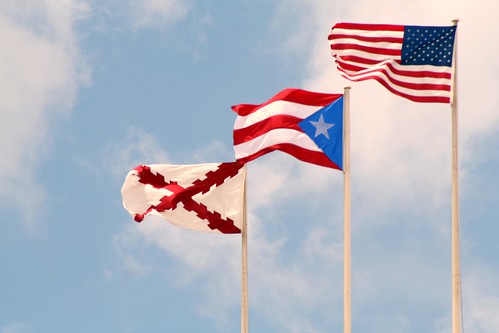
Ever stop to think how Spanish slang words develop? It’s a fun experience since their history will often teach you about major historical influences in a culture. These 5 Puerto Rican words do just that.
A colony of Spain for 400 years, we Puerto Ricans adopted words that are still alive today. For example, we use the word peseta (Spanish monetary unit prior to the Euro) instead of quarter, for the 25-cent coin. A century-long relationship with the United States has also influenced Puerto Rican Spanish. Even though Puerto Ricans have adopted a lot of English vocabulary (more than other Spanish-speaking countries), we don’t speak English fluently. There are some words, often called Spanglish, that are easily linked back to their English origins. Examples are: lonchera (lunch box), gufiao or gufeado (goof), parquear (to park) or pichear (to pitch).
But what about other words such as cangrimán, fostró, chavos, zafacón and limber? Are Puerto Ricans the only ones who use them? Where did they come from?
Puerto Rican Spanish Slang:
The Origin of CANGRIMAN, FOSTRÓ, CHAVOS, ZAFACÓN and LIMBER
![]() 1. cangrimán
1. cangrimán
Means an important person, the best, a person who wields power and needs to be respected. This word comes from the English “congressman”. In 1898 the United States took over Puerto Rico with a military government and also thrust English on locals. After 400 years of Spanish rule, Puerto Ricans didn’t understand English, and the word “congressman” sounded like cangrimán to them. The contraction cangri used today was popularized by reggaeton singer Daddy Yankee.
Examples:
No te metas con Luis. Tu sabes que el tipo es un cangrimán.
Déjamelo a mi. Tu sabes que yo soy el cangri y te voy a ayudar.
![]() 2. fostró
2. fostró
The word comes from the English “foxtrot”, a very popular dance from the 1930’s. Imagine the elements needed to dance a foxtrot: the music, the vocals, the progressive movements all over the dancing floor, the dancers… a hullabaloo! Fostró is associated with a bad, uncomfortable situation you want to get out of, for example, a big issue, argument, group of people out of control, or even a fight. A Spanish synonym is algarabía. You can interchangeably use the Puerto Rican revolú.
Examples:
María formó un fostró cuando le dije que no iba prestarle los chavos.
Cada vez que salgo con Natalia se forma un fostró.
![]() 3. chavos
3. chavos
Is the contraction of the Old Spanish word ochavo, a copper coin from the XVII-XIX centuries that weighed one-eighth of an ounce. The word ochavo is related to the word octavo (Spanish for an eighth). In Puerto Rico, chavos with an S is a generic term for money and does not represent any specific amount. However, chavo, with no S, means a penny or 1-cent. The diminutive chavitos is most often used to mean more than one penny to avoid using chavos which could mean both a generic term for money and the plural of pennies.
Examples:
Necesito chavos para comprar el periódico.
Por los chavos no te preocupes, que no hay.
Me faltan nada más que 5 chavitos.
![]() 4. zafacón
4. zafacón
Is the word for trash can or waste basket. The most popular story explains that the word comes from the English phrase “safety can” or “save a can,” but linguistic experts are skeptical about this version. They don’t find a logical explanation on how a phrase that starts with S evolves into starting with Z. The other argument that debunks the “safety can/save a can” hypothesis is that this word is also used by our neighbors from the Dominican Republic. How two countries independently developed the same word and usage does not have a credible explanation? The best hypothesis is that zafacón comes from the Arabic word zafa or zafaca which means a clay container or vasija. After the end of the Islamic Era in the Iberian Peninsula, Arabs came along with Spanish to conquer the new territories. After Latin, Arabic was the second-largest language that influenced Spanish.
Example:
Bótalo en el zafacón.
![]() 5. limber
5. limber
Its a homemade frozen Popsicle made with fruit juices. Traditionally it is homemade and sold from home, but in recent years there has been some commercialization. This treat got its name after American pilot Charles Lindbergh (say his last name with a Spanish pronunciation and you’ll get it), who was the first to fly solo across the Atlantic, in 1927. Lindbergh stopped by Puerto Rico on a future tour named the Goodwill Tour of Latin America and the Caribbean. There are some variations about this story. One indicates that he was welcomed with this treat when he landed, to relieve the heat of the Island. Others claim that the limber was created a couple of years after this trip. But the version I like most is the one that says apparently Lindbergh was not so emotional about the reception that Puerto Ricans gave him, so the treat was named after him because of his cold and hard personality.
Example:
No te preocupes, eso es como chuparse un limber.
Do you know the origin of words from your country?
Check out these other Puerto Rican Spanish Slang Word articles.
Featured photo credit: Spanish flag, PR flag, USA flag by Oscalito via flickr